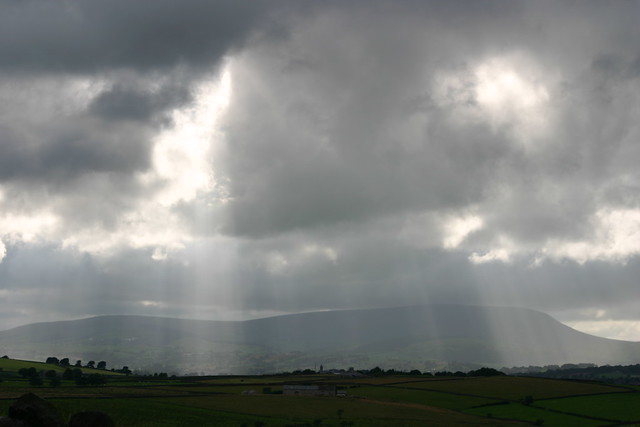I was reading the morning headlines the other day to see what had transpired overnight. Morning news functions the same as the evening news. One commentator once remarked about news programs:
"They tell you 'good evening', and then proceed to spend the next 30 minutes telling you why it is not so."
As our nation and world continues to reel under the "second wave" of COVID-19, I reflect on how this current time present challenges and opportunities for Christians and churches. As a pastor for over fifteen years and a preacher for nearly 30 years, I have found myself needing to make challenging decisions in this pandemic. In the midst of it all, I've daily asked myself the following questions: How can I remain faithful and courageous in a time where many are afraid? How can I consistently urge everyone to remain focused-on-God while reminding myself twice-as-much?
The Christian Faith and The Church will outlast COVID-19.
Such questions, and many others, press on my mind. I know other pastors too may raise similar queries. I have found that despite whatever is going on globally - whether politically, socially, economically or otherwise - the Christian faith and Christ's Church can thrive and will outlast COVID-19. We have a Bible that was inspired in eras fraught with famines, persecutions, wars and diseases. If for anything, the sufficiency of God's Word becomes more dear in seasons such as this. We have a risen and exalted Savior, The Lord Jesus Christ, Who is Prophet, Priest and soon-coming-King. He prays for the persisting faith of believers and His Church-at-large. A few thoughts were impressed upon my thinking while reading my Bible and the morning news which I'd like to share today about how Christians and churches can endure during this pandemic:
1. Look to the Bible.
2. Look to history.
3. Look to God.
Look to the Bible: Ever-Present Truth In Times Of Turmoil.
I'm reminded of the words of author A.W. Tozer in his book: "The Pursuit of God", wherein he equates "looking to God" to that of "trusting God". As I read Psalm 77 that day, I thought along with the Psalmist about "how much do I trust God".
Psalm 77 is a great passage of scripture to look through when facing worry, fear and anxiety. Worry is when I express doubt about the future. Fear is when I express doubt about the present. Anxiety is when doubt hounds me because of the past. Doubt is when we are caught between what we know we ought to trust and the temptation to abandon what we have always trusted. The Psalmist begins Psalm 77 by describing how he was dealing with life in his prayer-time to God:
"My voice rises to God, and I will cry aloud; My voice rises to God, and He will listen to me. 2 In the day of my trouble I sought the Lord; In the night my hand was stretched out and did not grow weary; My soul refused to be comforted."
What better time to seek God than now.
Most would say that all of 2020 has been one continuous "day of trouble". Yet, what better time to seek the Lord. For anyone that is honest, such seeking of God can often conflict with our hasty refusal to take comfort of any sort in the soul. Whenever the conventional routes of comfort are cut-off (friends, financial security, health, confidence in any sort of leadership, having ready answers) the soul grows numb. All of those "conventional routes of comfort, in the words of Solomon in Ecclesiastes, "lies under the sun". They are found inadequate to sooth the troubled soul, since only He that governs "over, in and through everything under the sun" can quell our inner storm.
The Psalmist himself pursues a line of questioning about God (Psalm 77:7-10). Yet, when we reach Psalm 77:11, the Psalmist discovered that God alone could calm his inner-anxieties by appealing to how He did it in the past. Psalm 77:11-12 expresses:
"I shall remember the deeds of the Lord;
I will certainly remember Your wonders of old. 12 I will meditate on all Your work, And on Your deeds with thanksgiving."
It is always a good thing to reflect upon God's faithfulness.
Where then do we find the "deeds of God" done on behalf of His people? For the Psalmist, appealing to scripture itself will yield the reminders. As one reads the remainder of Psalm 77:13-20, a rehearsal of the Exodus account is brought to mind (see Exodus 3-18). Anyone who reads that section in the Book of Exodus can draw the connection between "what God did" and "what God can do again". As I peruse Old and New Testaments alike, I find out how faithful God was to His people in plague, famine, persecution and loss. Such reminders from the Scriptures prompt me to think back on how good God has been over the years. For the Christian and the church-at-large, fleeing to the scriptures to search after "all that God has done and can-still-do" gives us the anchor of truth as we ride out this pandemic.
Look To The Past: An Ever-Present Reminder Of How We Can Respond In Times Of Testing.
As we noted in our study of Psalm 77 above, the Psalmist had recourse to God's past deliverances of Israel as a way of coping with his circumstances. Scripture elsewhere urges us to consider how God dealt with His people in times past and how His people responded positively (see Acts 2) or negatively (Hebrews 3-4). God's dealings and people's responses provide valuable lessons. Undoubtedly, observing how Jesus dealt with the increasing demands of life provides fuel for the Christian when their tank is nearly empty (see 1 John 2:6). Paul reminds us that the Scriptures were inspired to not only provide principles for current living, but hope for abundant living in the love of Christ (see Romans 15:4).
Christians and churches have been down this path already, and God saw them through it all.
Most reading this blog might recall another pandemic which afflicted our world in 1918-1919. Many in recent days have drawn parallels and lessons from how the United States and churches within it responded to the dreaded Influenza outbreak. I was reading of how churches in Mobile, Alabama and Pittsburgh, Pennsylvania closed their doors during those harrowing days. Some churches decided to open their buildings for the purpose of temporary sick-wards. Others began to publish weekly newsletters with sermons and encouragements. Pastors encouraged church members to dedicate 11:00 a.m. as a time for family prayer and devotion. A few churches, of course, remained open, believing they needed to provide ministry to those who were in need. By-and-large, whether in Ohio, or Pennsylvania or the South, the church-at-large persisted and carried-out her mission, whether or not they met.
How God brought a greater good out of turbulent times.
As I read some of the headlines back in 1918-1919, I was reminded of how much the United States was under the grip of not only a deadly pandemic, but also World-War I. In a "Baptist-Press" article (associated with the SBC), I learned how God used those dire circumstances to enable the church to flourish (https://www.baptistpress.com/resource-library/news/first-person-how-a-pandemic-100-years-ago-ushered-in-a-new-era-of-baptist-giving/.)
The Southern Baptist Convention urged all of its churches to raise funds for missions by setting of goal of $75 million dollars within a five-year span. Although the goal fell-short, yet, from 1918-1919, SBC churches raised more missionary support in that one-year than in the ten-years prior. Remarkably, the SBC was led to reconsider how it would support it's growing number of missionaries in North America and abroad. The launching of the "Cooperative Program" in 1925 meant that every church would contribute a portion to one large fund from whence every missionary would draw support. Would such an effort, to organize around missionary support, had emerged without the pressures of a world war and world-wide pandemic? We can speculate. However, we have the past events which tell us that prevailing circumstances of that time were used by God to bring about a much-greater-good.
Studying the past, whether secular history or church history, can aid us in seeing how God's Providence (that work which God does in guiding, preserving and influencing people and history towards the goal of His will) is at work. To realize that our own time is not "unprecedented" gives us a much-needed "second-reference-point" which, when submitted to the Scriptures, helps navigate the difficulties with newfound hope.
A pastor's lessons gleaned from observing God's Providence in his life.
John Flavel, a late 17th century Christian author, wrote a wonderful book entitled: "The Mystery of Providence". Flavel was a pastor who had experienced outbreaks during his time. He had pastored for many years and experienced the loss of three wives (each to sickness) and the loss of a child (during delivery by his second wife). Flavel knew pain. More importantly, Flavel knew His God. He wrote the following words which apply to us:
"It is here supposed to be the Christian's great duty, under the apprehensions of approaching troubles, to resign His will to God's and quietly commit the events and their outcome to Him, whatever they may prove."
Such recollections show us how God can "work all things together for the good, to those who love God, who are the called according to His purpose" (Romans 8:28).
Focus on God: An Ever-Present Help In Time-Of-Need.
Seeing God's Providential Hand at work in the past and hearing His powerful voice through His Word encourages the Christian to look to Him. Hebrews 4:14-16 gives us a word of exhortation to consider:
"Therefore, since we have a great high priest who has passed through the heavens, Jesus the Son of God, let’s hold firmly to our confession. 15 For we do not have a high priest who cannot sympathize with our weaknesses, but One who has been tempted in all things just as we are, yet without sin. 16 Therefore let’s approach the throne of grace with confidence, so that we may receive mercy and find grace for help at the time of our need."
Closing thoughts.
Our God never changes (Malachi 3:6). He is unvarying, and thus, there is no shifting nor turning of shadow within Him (James 1:17). To know I can, through Jesus, boldly approach Him in prayer means that I ought to run to Him at all times. When I am worried - He provides His perfect peace that surpasses all understanding (Philippians 4:6-7). When I am anxious, rather than making a hasty decision, I need to "wait on the Lord". Consequently, through "waiting on God", I learn to trust that He will, in turn, "renew my strength" (see Isaiah 26:3; 40:31). When I am afraid, I need only to look to God, who tells me to "not be afraid" (compare John 14:1-3; Hebrews 13;5,6,8). When I look to God's Word and look to the lessons of the past, I can then look to God. He alone knows the future. God can gives a clear path to live out the Christian faith and for the church to pursue His mission for her during the pandemic and beyond.








